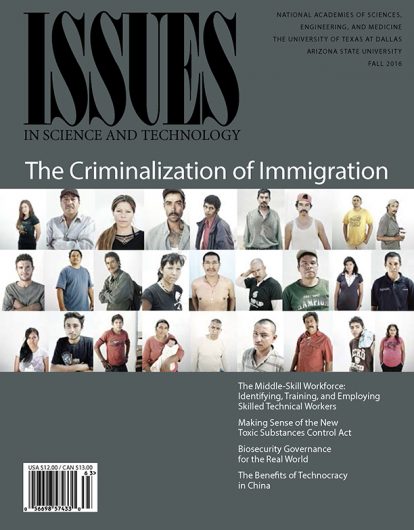CSPO News
Fall 2016 Issues in Science and Technology
The newest "Issues" looks at the criminalization of immigration, middle-skill jobs, chemical safety, and more.
In the cover story for the Fall 2016 Issues in Science and Technology, Mary C. Waters contends that the problems of mass incarceration and undocumented immigration have created legal forms of oppression that, although not formally racist, have a disproportionate impact on African American and Latino communities in the United States. In order to bring ex-felons and undocumented immigrants into the formal economy, Waters, the M. E. Zuckerman Professor of Sociology at Harvard University, argues forcefully that we need a social movement not based on civil rights—having legally excluded former prisoners and the undocumented from civil society—but on the human right for social inclusion. Accompanied by David Harriman’s portraits of deported immigrants, the essay is a powerful call to rethink how we study and understand immigration and incarceration.
A path to the middle class—precisely what America’s exclusionary policies preclude for ex-felons and undocumented immigrants—is the subject of a special editorial package on middle-skill jobs. Essays by Alicia Sasser Modestino, Jonathan Rothwell, Bianca K. Frogner and Susan M. Skillman, and Andrew Reamer explore the skills and jobs that can create a high-quality labor force and boost economic productivity. The pieces include an overview of the parts of the economy where technical skills are becoming ever-more necessary; a close look at the ways that technology is transforming job requirements; a deep dive into the rapidly evolving health care industry; and a call for better information to help both workers and policymakers make informed decisions.
In another special section, we have two perspectives on the revisions to the failed Toxic Substances Control Act. David Goldston of the Natural Resources Defense Council provides an overview of the changes in the Frank R. Lautenberg Chemical Safety for the 21st Century Act, and the uncertainties that remain in protecting the public from harmful chemicals. Keith B. Belton, of Pareto Policy Solutions LLC, and James W. Conrad Jr., of Conrad Law & Policy Council, focus on how the new act puts risk assessment at the center of the regulatory regime.
Also in this issue, Sam Weiss Evans looks at the challenges posed by dual-use research of concern—the kind of scientific research that could be either beneficial or dangerous. He calls for a new approach to biosecurity governance, one based on how scientific knowledge is actually produced and disseminated. Liu Yongmou, a professor at Renmin University in China, evaluates the role of technocracy in shaping how the People’s Republic confronts social and technological problems.
The fall book review section opens with assessments of two books in Polity’s series on science and society: Carl Mitcham reviews Are We All Scientific Experts Now? by Harry Collins, and Braden R. Allenby evaluates Can Science End War? by Everett Carl Dolman. Emily Therese Cloyd looks at the experience of being a professional scientist in her review of Hope Jahren’s best-selling Lab Girl. Finally, Prajwal Kulkarni explores the entanglement of faith and science surveyed by Roger Wagner and Andrew Briggs’ The Penultimate Curiosity: How Science Swims in the Slipstream of Ultimate Questions.
This issue also features artwork by data artist Laurie Frick, and the beguiling sculptures of Matthew Shlian.
